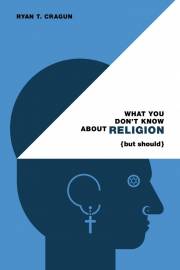 What is a religion? Why are people religious? Are religious people more educated than nonreligious people? Are religious people more moral? Are they humbler or happier? Are religious people more or less prejudiced than nonreligious people? Are religious people better at coping with death? Is religion good for your health? Are people becoming more or less religious? Are people becoming more or less religious? Studying religion as a social phenomenon, Ryan T. Cragun follows the scientific data to provide answers to these and other questions. At times irreverent, but always engaging and illuminating, What You Don’t Know About Religion (but Should) is for all those who have ever wondered whether religion helps or hurts societyÔÇöor questioned what the future holds for religion.
What is a religion? Why are people religious? Are religious people more educated than nonreligious people? Are religious people more moral? Are they humbler or happier? Are religious people more or less prejudiced than nonreligious people? Are religious people better at coping with death? Is religion good for your health? Are people becoming more or less religious? Are people becoming more or less religious? Studying religion as a social phenomenon, Ryan T. Cragun follows the scientific data to provide answers to these and other questions. At times irreverent, but always engaging and illuminating, What You Don’t Know About Religion (but Should) is for all those who have ever wondered whether religion helps or hurts societyÔÇöor questioned what the future holds for religion.
EDITORIAL REVIEWS
REVIEW
“An extremely lively, engaging, and enjoyable book. Cragun masterfully weaves together personal anecdotes, international current events, sociological data, relevant social issues, and theoretical insights in presenting a sober, clear, and at times quite passionate introduction to how social scientists understand and approach religion. ┬áThis highly readable, conversational, and yet soundly argued book is strongly, enthusiastically recommended.”
“Ryan Cragun has given us a witty, concise, trenchant yet many-faceted summary of the phenomena of religion in contemporary society. ┬áIt might have been titled Everything You Ever Wanted to Know about Religion, but Didn’t Know Who to Ask. ┬áAs this book makes clear, Ryan Cragun is who to ask.”
“A long-overdue counterweight to books designed around religious boosterism, What You Don’t Know about Religion (but should) is an empirically based examination of religion that extensively catalogues what has been previously overlooked. ┬áPlainly stated, personal, and conversational in tone, without jargon or overly complex language, this book mixes poignant anecdotes with social science findings across many domains, including ethics, education, social behavior, family life, gender and racial attitudes and more.”
